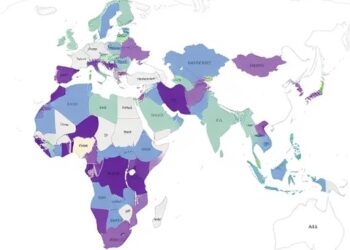Curbing the confirmed human influence on the climate system and mitigating climate change require profound transformation of global energy system. In this context, modeling technical progress and innovation within Integrated Assessment Models (IAMs) is crucial for providing insights about the consequences of long-term energy system transformation, and capturing the development of several interacting systems and technical evolution process.
Curbing the confirmed human influence on the climate system and mitigating climate change require profound transformation of global energy system. In this context, modeling technical progress and innovation within Integrated Assessment Models (IAMs) is crucial for providing insights about the consequences of long-term energy system transformation, and capturing the development of several interacting systems and technical evolution process.
A review of Endogenous Technological Change (ETC) written by Hongbo Duan and Yixin Sun has been published recently, outlining IAM modeling tricks in ETC frameworks. They systematically demonstrates current techniques and theoretical foundations for handling endogenous technical change, using the E3METL model as an example.
The team published their review in Energy and Climate Management on June 12, 2024.
“In this review, we offer a comprehensive overview of the endeavors undertaken by our research team to integrate endogenous technical progress mechanisms into a global multi-regional integrated assessment model. Through the incorporation of Learning-by-Doing and Learning-by-Research learning curves, alongside the Logistic technical mechanism, our model demonstrates the implications of energy technology advancement, economic impacts, and shifts in abatement costs. These insights underscore the pivotal role of ETC in economic and energy system dynamics”, explained Hongbo Duan, senior author of the paper and professor at the School of Economics and Management, University of Chinese Academy of Sciences. Dr. Duan is also the esteemed recipient of the National Science Fund for Distinguished Young Scholars.
In the early stages, exogenous technological change was predominant in integrated assessment modeling. Specifically, in top-down models, the constant elasticity substitution (CES) function has been widely used to model energy technological substitution, leaving energy technology advancement externalized by autonomous energy efficiency improvement (AEEI); while in bottom-up models, they were always modeled as a range of specific energy technologies with competitive relationships, treating technological progress as an exogenous process of cost and efficiency improvements. Due to gradually deepening cognition of both energy system and social transition, modelers have recognized that IAMs with induced endogenous technical change produce more reasonable and explanatory outcomes in pathways assessment of climate policy.
The authors outline the progress made in ETC modeling to introduce a variety of ways from both the supply and demand sides for technological change into IAMs. “For modeling technical change in demand sectors, incorporating R&D investments into the economic structure, known as induced innovation, is perhaps the most common technique in top-down macroeconomic IAMs”, stated Yixin Sun, the co-author of the study. “However, it lacks the description of knowledge externalities and the micro foundations of modern endogenous growth theory, making it unclear who is responsible for R&D activities”, Yixin added.
From the supply side, the concept of endogenous technological change can be well represented by learning curves, which illustrates the internal factors driving technical progress. The learning process specifically manifests as the Learning-by-Doing (LBD) effect, where production costs decrease exponentially as cumulative production increases, and the Learning-by-Searching (LBS) effect, where production costs decrease exponentially as knowledge capital increases. Two-factor learning curves have been gradually applied in many researches with increasing consideration of endogenous technical progress in energy system models. For instance, E3METL made a preliminary attempt to incorporate the revised logistic curve to capture the S-shaped technology competition. It was discovered that describing the penetration of non-carbon technologies and determining the optimal carbon tax increasingly rely on the learning rate.
One of the challenges of endogenous technological development is incorporating more dependence among multi-sectors and across time, making the model more realistic. In recent years, several new strands of theories and methods have emerged that aim to contribute valuable insights towards technical transitions to climate policy assessment. This includes studies on Directed Technical Change (DTC) theory originated from endogenous economic growth, socio-technical approaches focusing on the evolution of technology diffusion, technology choice models based on Discrete Choice Theory (DCM), as well as agent-based models characterized by heterogeneity and bounded rationality. “In future research, exploring the regional impacts of technology-driven non-energy systems will also be regarded an important direction”, stated Yixin Sun.
This work was supported by the National Natural Science Foundation of China (72325008, 72274188 and 72022019), Youth Innovation Promotion Association of Chinese Academy of Sciences (2021164), and Environmental Defense Fund (EDF2022).
About Energy and Climate Management
Managing the changing climate and energy transition are two closely related scientific and policy challenges of our society. Energy and Climate Management is an open access, peer-reviewed scholarly, policy-oriented academic journal dedicated to publishing interdisciplinary scientific papers on cutting-edge research on contemporary energy and climate management analysis. The Journal is exclusively available via SciOpen and aims to incentivize a meaningful dialogue between academics, think tanks, and public authorities worldwide. Contributions are welcomed covering areas related to energy and climate management, especially policy, economics, governance, and finance. Online submission portal available at https://mc03.manuscriptcentral.com/jecm.
About SciOpen
SciOpen is a professional open access resource for discovery of scientific and technical content published by the Tsinghua University Press and its publishing partners, providing the scholarly publishing community with innovative technology and market-leading capabilities. SciOpen provides end-to-end services across manuscript submission, peer review, content hosting, analytics, and identity management and expert advice to ensure each journal’s development by offering a range of options across all functions as Journal Layout, Production Services, Editorial Services, Marketing and Promotions, Online Functionality, etc. By digitalizing the publishing process, SciOpen widens the reach, deepens the impact, and accelerates the exchange of ideas.
Journal
Energy and Climate Management
Article Title
Does Endogenous Technological Change Matter in Model-Based Climate Change Narratives
Article Publication Date
12-Jun-2024




